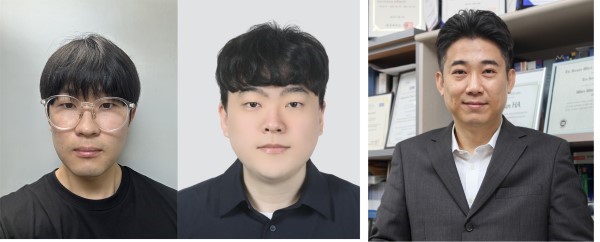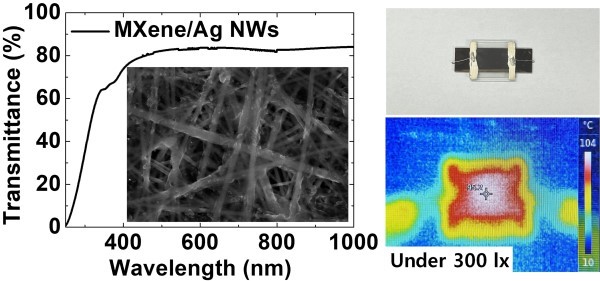Prof. Tae-jun Ha's Research Team Develops a High-performance Mobile Transparent Heater
- admin
- 2024-09-13
- 1677
· Professor Tae-Jun Ha's Research Team (Department of Electronic Materials Engineering) Develops a High-performance Mobile Transparent Heater Powered by Indoor Solar Cells
Based on an All-solution-processed MXene/Ag Nanowire Composite Electrode

(From
left) Se-ryong Park, MS-PhD integrated program; Sang-jun Park, MS-PhD
integrated program; Professor Tae-Jun Ha
Professor Tae-Jun Ha’s research team
(Department of Electronic Materials Engineering), in collaboration with
Professor Joo-Hoon Kim from Kyung Hee University, developed an MXene/Ag
nanowire composite electrode using spray coating and succeeded in implementing
a high-performance mobile transparent heater that can generate heat using
indoor solar cells without an external power source. This research was
published in Applied Surface Science (IF: 6.7, JIF ranking: 97.6%), one of the
top international journals in the field of materials science, by Elsevier,
under the title 'Highly stable low-voltage operating mobile transparent heaters
based on spray-coated MXene/silver nanowire nanocomposite electrodes powered by
indoor solar cells.'
Recently, transparent
heaters have gained attention for their potential applications in various
fields, such as outdoor displays, avionics, and dehumidification and de-icing
of automotive glass. Indium tin oxide (ITO) has primarily been used as a
transparent electrode material due to its high optical transmittance and low
sheet resistance. However, because of its relatively poor thermal response and
heating rate, recent research has focused on using one-dimensional silver
nanowires (Ag NWs) as an alternative. However, these low-dimensional
transparent electrode materials have a significant issue with operational
stability, as they tend to oxidize by reacting with oxygen and water molecules
in the air when heat is generated in the transparent heater. Professor Tae-Jun
Ha's research team (Department of Electronic Materials Engineering)
successfully developed a high-performance transparent heater by using MXene, a
2D material with excellent electrical conductivity and thermal stability, as a
protective layer and effectively combining it with a nanowire network through
an optimized solution process, which both lowers sheet resistance and
suppresses oxidation. The fabricated transparent heater not only replaces
conventional ITO transparent electrodes but also generates heat exceeding 120°C
at a voltage of 5V. It demonstrated high reliability even after 500 on/off
cycles and maintained excellent operational stability with almost no
performance degradation after generating heat continuously for 10 days. Additionally,
in collaboration with Professor Joo-Hoon Kim from Kyung Hee University, they
demonstrated the potential application of efficiently removing moisture using a
high-performance mobile transparent heater powered by indoor solar cells,
operating without an external power source.
Meanwhile, this
research was supported by the Carbon Neutral Industrial Core Technology
Development Project, supervised by the Ministry of Trade, Industry and Energy
, and the Basic
Research Laboratory Program of the National Research Foundation of Korea,
supervised by the Ministry of Science, ICT and Future Planning. Professor
Tae-Jun Ha's research team is currently conducting extensive research on
next-generation electronic devices and renewable energy technologies based on
advanced materials. They have published over 60 papers in SCI journals and hold
more than 30 international and domestic patents related to low-dimensional
functional composite materials.

Structure and
transmittance of the MXene/Ag NWs composite electrode-based transparent heater,
along with the demonstration results of the mobile transparent heater powered
by indoor solar cells
?